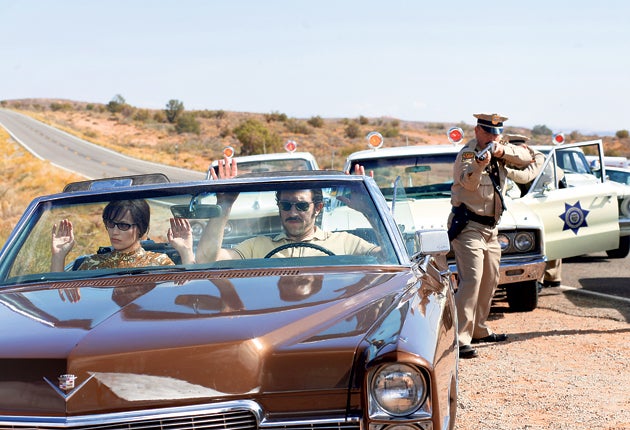Mesrine: Killer Instinct, Jean-François Richet, 113 mins, (15)<br/>Home, Ursula Meier, 97 mins, (15)
Vincent Cassel puts in a mesmerising performance in this breathless biopic of France's most infamous bank robber

There were only six months between Kill Bill: Volumes One and Two, and six weeks separating the two halves of Steven Soderbergh's Che.
But the releases of Mesrine: Killer Instinct and Mesrine: Public Enemy Number One leave you even less breathing space. A pair of biopics which race through 20 years in the life of Jacques Mesrine, France's most infamous bank robber and jailbreaker, both films are in cinemas this month, just three weeks apart. Each instalment is an invigorating blast in its own right, but it's best to see them both in quick succession. You'll not only feel as if you've experienced an authentic gangster classic, but you also may get over the disappointment of this summer's other true crime thriller, Public Enemies.
The films are an astounding showcase for Vincent Cassel. Appearing in almost every scene, he gains three stone over course of the four-hour saga, as Mesrine develops from a small-time housebreaker to a Robin Hood-like anti-hero. Mesrine is, by any reckoning, a very nasty piece of work, but Cassel plays him as a mercurial clown who swaggers through marriage, fatherhood and armed robberies with the same lust for life, red-blooded machismo and simmering energy. We might not forgive his crimes, but we want to keep on watching them.
At the start of Killer Instinct, he's a dutiful young soldier who's ordered to shoot captives in cold blood while serving in Algeria in 1959. Returning to Paris, he's keen to start afresh, but he drifts into what he euphemistically describes as "off-the-books work" to cover his poker losses.
Soon he comes into contact with a magnetically loathsome godfather named Guido, played with relish by a gravel-voiced, yellow-toothed Gérard Depardieu. Under Guido's wheezing tutelage, Mesrine grows ever more audacious, eventually teaming up with a thrill-seeking prostitute (Cécile de France) to form a Gallic answer to Bonnie and Clyde, and becoming an unlikely hero of the Quebec Liberation Front.
On first viewing, Mesrine: Killer Instinct can be frustrating. There are dozens of enthralling heists and shoot-outs, fights and seductions, but instead of settling into a steady narrative, with a sustained central plot, the film keeps whisking you on to the next explosive episode. Only once you get used to this breathless structure can you enjoy it for what it is. Based on a memoir which Mesrine wrote in prison, Killer Instinct is the equivalent of a page-turning autobiography that skips to the most scurrilous anecdotes without pausing for reflection.
Not that the episodes are unconnected. One linking thread is Mesrine's search for a father figure, a substitute for the père he despises as a weakling and a Nazi collaborator. Another theme is that Mesrine is a product of his economic and social surroundings. Despite the subtitle, his killer instinct could easily have lain dormant if it weren't for a series of redundancies. It's only at the very end of the film, after a spell in Canada's most inhumane prison, that he commits himself wholeheartedly to death-or-glory criminality. As for what happens then ... well, anyone who sees Mesrine: Killer Instinct will be relieved they only have to wait three weeks to find out.
This week's other French-language gem is Home, the debut feature from a Swiss documentarian, Ursula Meier. Isabelle Huppert and Olivier Gourmet star as a happy couple who live with their three children in a house far from any others, on the edge of a beautiful rolling meadow. After establishing what a playfully affectionate bunch they are, Meier shows us, in the first of many splendid surprises, that they're not quite on the meadow's edge, after all. Just a few feet from their front door, an unfinished motorway stretches for miles in either direction. It's the proverbial elephant in the room. The road has been abandoned for a decade, so the children cycle and play hockey on it, no longer even noticing how surreal their situation is.
Then comes the fateful fleet of construction lorries. A new layer of tarmac goes down; white lines are painted; barriers are bolted together, and suddenly four lanes of solid traffic are thundering past Huppert's house every day. It's an absurd scenario, but for all the unforgettable weirdness of the imagery, Home remains a sharply observed, believable portrait of an ordinary family.

Watch Apple TV+ free for 7 days
New subscribers only. £8.99/mo. after free trial. Plan auto-renews until cancelled

Watch Apple TV+ free for 7 days
New subscribers only. £8.99/mo. after free trial. Plan auto-renews until cancelled
Compassionate, bright, and bracingly unpredictable, it's reminiscent of Jacques Tati and Jean-Luc Godard, but it also has the spirit of an Ealing comedy. Huppert and her brood are like the plucky heroes of Passport to Pimlico, eccentrically determined to live life their own way, even as the modern world bears down on them. It's only in the film's final stretch that the tone turns dark and apocalyptic. By the end, the motorway isn't just a motorway; it's any inescapable, inexorable destructive force – or perhaps it's just change itself.
See it – but don't take the car.
Subscribe to Independent Premium to bookmark this article
Want to bookmark your favourite articles and stories to read or reference later? Start your Independent Premium subscription today.

Join our commenting forum
Join thought-provoking conversations, follow other Independent readers and see their replies